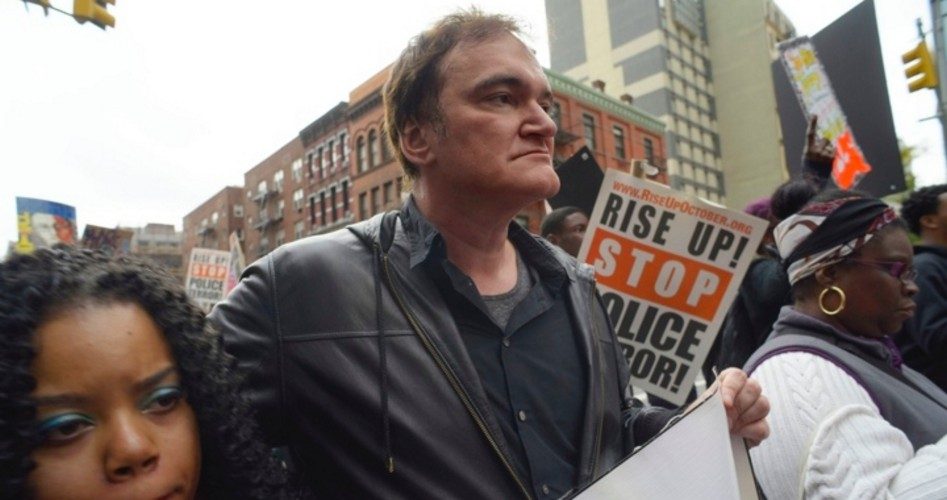
Police groups in major cities across the country are banding together in protest to boycott the films of director Quentin Tarantino (shown), who recently made inflammatory anti-police remarks at a rally to protest police brutality. Tarantino’s actions are just the latest display of anti-police behavior that critics claim has led to the “Ferguson Effect.”
The New York Times reports that Tarantino, an Academy Award-winning filmmaker known for films such as Pulp Fiction and the Kill Bill movies, flew to New York City from California last weekend to participate in the RiseUpOctober protests against police shootings across the United States. Organizers for RiseUpOctober claim the protests are to oppose a “genocidal assault on black and Latino people in this country.”
According to Fox News, the timing for the rally was poorly planned, as it “came in the wake of the shooting death of 33-year-old Officer Randolph Holder,” who was shot to death while pursuing a bicycle thief.
The New York Post reports that Tarantino did acknowledge the terrible timing of the rally as “unfortunate,” but he also asserted that the rally needed to go on because some people had traveled long distances to attend. In other words, his busy schedule simply could not allow for a tactful delay of the protest to allow the NYC to mourn the loss of a fallen officer.
To make matter’s worse, at Saturday’s protest, Tarantino was quoted by the Associated Press as saying, “I’m a human being with a conscience. And if you believe there’s murder going on then you need to rise up and stand up against it. I’m here to say I’m on the side of the murdered.”
Tarantino’s participation in the event and the comments he made prompted the head of the New York Police Department’s Union to call for a boycott of Tarantino’s films. “It’s no surprise that someone who makes a living glorifying crime and violence is a cop-hater, too,” Patrick Lynch, president of the Patrolman’s Benevolent Association, said Sunday in response to Tarantino. “The police officers that Quentin Tarantino calls ‘murderers’ aren’t living in one of his depraved big-screen fantasies — they’re risking and sometimes sacrificing their lives to protect communities from real crime and mayhem.”
NYC police commissioner William Bratton also took issue with Tarantino’s comments. “Shame on him, particularly at this time when we are grieving the murder of a New York City police officer,” Bratton said on WNYM-AM. “There are no words to describe the contempt I have for him and his comments at this particular time.”
The NYPD found support for the boycott amongst the police in big cities across the country, reports Time magazine online. John McNesby, president of the Philadelphia police union, said his organization voted unanimously to join the boycott against Tarantino. “Tarantino has shown through his actions that he is anti-police,” McNesby said in a statement. “Mr Tarantino has made a good living through his films, projecting into society at large violence and respect for criminals; it turns out he also hates cops.”
Likewise, Los Angeles Police Protective League president Craig Lally announced that his union supported the boycott against Tarantino’s films. “We fully support constructive dialogue about how police interact with citizens,” said Lally. “But there is no place for inflammatory rhetoric that makes police officers even bigger targets than we already are.”
He said Tarantino “took irresponsibility to a new and completely unacceptable level this past weekend by referring to police as murderers during an anti-police march in New York. He made this statement just four days after a New York police officer was gunned down in the line of duty.”
“And questioning everything we do threatens public safety by discouraging officers from putting themselves in positions where their legitimate actions could be falsely portrayed as thuggery,” he added.
Naturally, RiseUpOctober organizers defended Tarantino and claim the boycott is an effort to intimidate protestors. “It is aimed at sending a message, not just to Tarantino, but to anyone whose voice carries great weight in society,” said Carl Dix, one of the group’s organizers. “If you speak out, we will come after you, threaten your livelihood and attempt to scare you back into silence.”
But critics assert that groups such as RiseUpOctober that make use of inflammatory rhetoric are contributing to the “Ferguson Effect,” which refers to the dramatic increase in crime that followed a two-decade-long drop in crime.
According to FBI Director James Comey, the “Ferguson Effect” is the result of increased scrutiny of police that has led criminals to become emboldened and police to become reluctant to fight crime effectively.
In an op-ed by Heather MacDonald that appeared in the Wall Street Journal, MacDonald attributed this trend to the prevalent anti-police rhetoric that has inundated the airwaves:
The airwaves have been dominated by suggestions that the police are the biggest threat facing young black males today. A handful of highly publicized deaths of unarmed black men, often following a resisted arrest … have led to riots, violent protests and attacks on the police.
In addition to increased violence against police, this trend has also resulted in police officers unjustly being treated like social pariahs. Stories of police officers being denied service at local fast-food restaurant establishments are proof of that.
Meanwhile, MacDonald noted in another op-ed for the New York Times that the true victims of the Ferguson Effect are “law-abiding citizens of crime-ridden areas,” the same people that groups like RiseUpOctober are allegedly fighting to “protect.”
MacDonald observed, “If police officers disengage, the casualties will be millions of law-abiding residents of crime-ridden neighborhoods who were liberated from fear by the last two decades of proactive enforcement.”
But Breitbart’s John Nolte contends that is in fact the goal:
The rise in crime is, of course, all part of the Left’s Cloward-Piven strategy to further empower central government, and the elite few who benefit from it, by stoking despair and fear — which only increases dependence on the same federal government intentionally causing the problem.
Being anti-police is no different from any other type of stereotyping. Treating all police officers like murderers, and assuming police officers are automatically in the wrong whenever a black assailant is killed are examples of sweeping generalizations, the same type that groups such as Black Lives Matter and RiseUpOctober claim to oppose.
All lives matter, not just black lives. Police lives should matter too, and the anti-police rhetoric is placing a target on their backs. For this reason, Americans might consider joining the police in boycotting against Tarantino’s films.
Photo of Quentin Tarantino: AP Images




